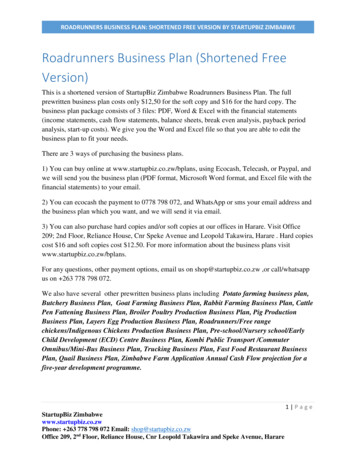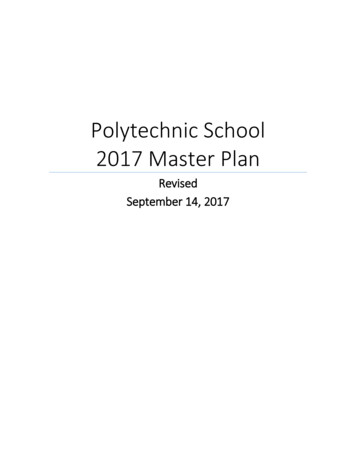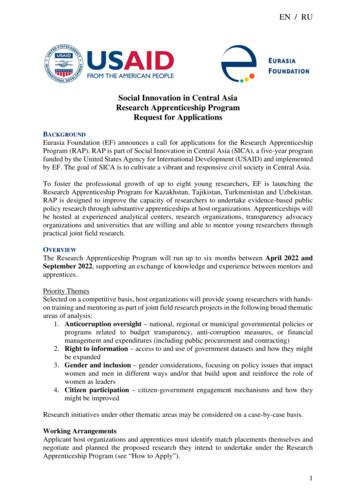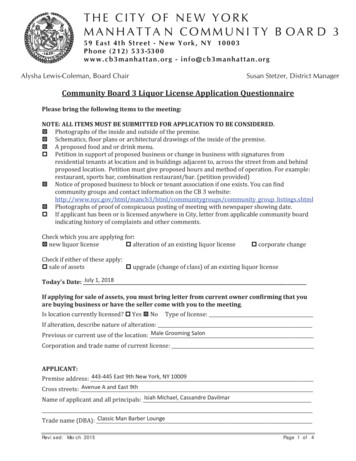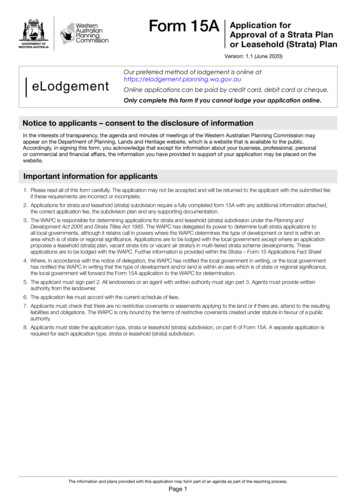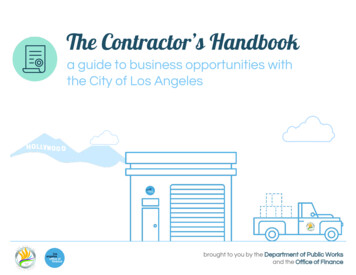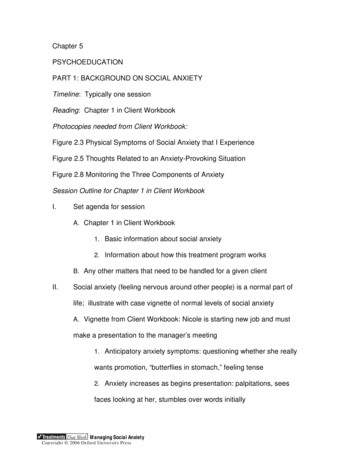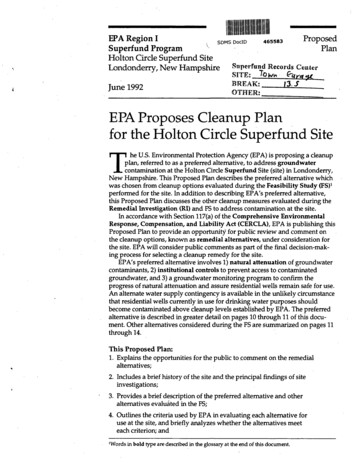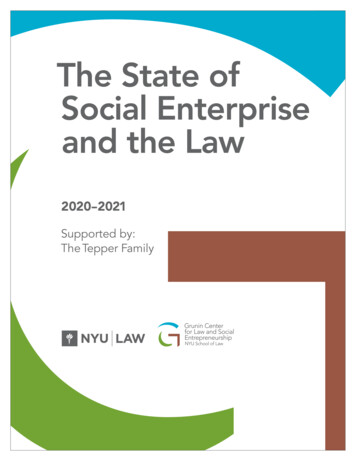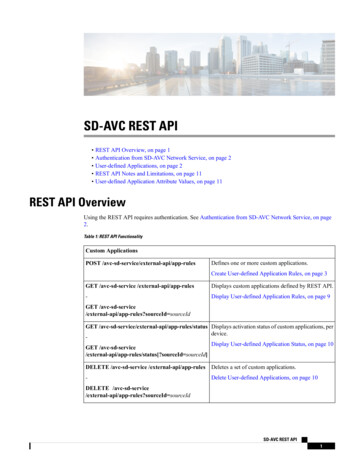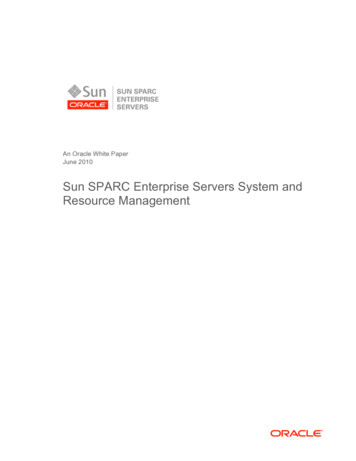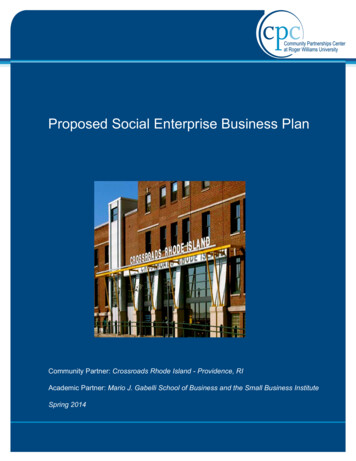
Transcription
Proposed Social Enterprise Business PlanCommunity Partner: Crossroads Rhode Island - Providence, RIAcademic Partner: Mario J. Gabelli School of Business and the Small Business InstituteSpring 2014
The Roger Williams University Community Partnerships CenterThe Roger Williams University (RWU) Community Partnerships Center (CPC) provides project based assistance tonon-profit organizations, government agencies and low- and moderate-income communities in Rhode Island andSoutheastern Massachusetts. Our mission is to undertake and complete projects that will benefit the localcommunity while providing RWU students with experience in real-world projects that deepen their academicexperiences.CPC projects draw upon the skills and experience of students and faculty from RWU programs in areas such as: American Studies Architecture and Urban Design Business Community Development Education Engineering and Construction Management Environmental Science and Sustainability Finance Graphic Design Historic Preservation History Justice Studies Law Marketing and Communications Political Science Psychology Public Administration Public Relations Sustainable Studies Visual Arts and Digital Media Writing StudiesCommunity partnerships broaden and deepen the academic experiences of RWU students by allowing them towork on real-world projects, through curriculum-based and service-learning opportunities collaborating with nonprofit and community leaders as they seek to achieve their missions. The services provided by the CPC wouldnormally not be available to these organizations due to their cost and/or diverse needs.CPC Project Disclaimer: The reader shall understand the following in regards to this project report:1. The Project is being undertaken in the public interest.2. The deliverables generated hereunder are intended to provide conceptual information only to assist design andplanning and such are not intended, nor should they be used, for construction or other project implementation.Furthermore, professional and/or other services may be needed to ultimately implement the desired goals of thepublic in ownership of the project served.3. The parties understand, agree and acknowledge that the deliverables being provided hereunder are beingperformed by students who are not licensed and/or otherwise certified as professionals. Neither RWU nor the CPCmakes any warranties or guarantees expressed or implied, regarding the deliverables provided pursuant to thisAgreement and the quality thereof, and Sponsor should not rely on the assistance as constituting professionaladvice. RWU, the CPC, the faculty mentor, and the students involved are not covered by professional liabilityinsurance.4. Neither RWU, the CPC, the faculty mentor, nor the students involved assume responsibility or liability for thedeliverables provided hereunder or for any subsequent use by sponsor or other party and Sponsor agrees toindemnify and hold harmless RWU, the Center, the Faculty Mentor, and the Center’s student against any and allclaims arising out of Sponsor’s utilization, sale, or transfer of deliverables provided under this Agreement.Community Partnerships CenterRoger Williams UniversityOne Old Ferry RoadBristol, RI 02809cpc@rwu.eduhttp://cpc.rwu.edu
Crossroads Rhode IslandPhase I Business CaseMario J. Gabelli School of BusinessBUSN 435 – Small Business InstituteProfessor Joel CooperJoe Brookes Darci Lake Victoria Fernandez Matt RosenfieldSpring 2014
Executive SummaryThis project was a collaborative effort between Crossroads RI andRoger Williams University’s Community Partnership Center (CPC) andGabelli School of Business. Crossroads RI established a need forguidance addressing the challenge of creating a job training andemployment opportunity Social Enterprise for clients of Crossroads RI.The Phase I(February-May 2014)The Phase I team of business students conducted a feasibility study ofseveral social enterprise options while emphasizing utilization of theRhode Island Waste Stream.The job training opportunity for each social enterprise option was ratedas high, moderate, or low in value for Crossroads clients. These ratingswere based on the following determining factors: Does the training opportunity entail interaction with customers Does the training opportunity require dealings with money Is there diversity in training opportunities in the social enterprise What technical skills are required for each position How many service hours are available for each participant How applicable are the acquired skills to the employment marketConclusions were drawn about each option as follows: Retail thrifto Non-sustainable due to the close proximity of competitorso High valued job trainingo Not Feasible Sustainable Farmingo Close proximity of existing farms to Crossroads, RIo Good availability of partnershipso Low valued job trainingo Feasible Recyclingo Success dependent on partnerships being availableo High valued job trainingo Moderately feasible Electronic Wasteo Strict rules and regulationso Extensive industry knowledge requiredo Moderately valued job trainingo Not feasible2
Food Serviceso Program already in effect Shift in staffing from volunteers to Crossroads, RIclienteleo Moderately valued job trainingo FeasibleComposite Wasteo Waste stream extraction process is not yet developed forthis product lineo Expensive process with little profit for small scale operationo Unknown value of job trainingo Not feasibleFinancial ImpactIt became clear in the Phase I analysis that greatest impact onfinancial feasibility would be to pursue “expense offset”, such as grantsor donations, to contribute to the location and resources costsassociated with the implementation of a job training and job creationSocial Enterprise for Crossroads RI. After the initial expense offset thechosen enterprise must be able to financially sustain itself. Once thePhase II team selects a product line to pursue, financial feasibility willbe of primary concern.3
IntroductionCrossroads RI has been working with St. Vincent de Paul (SVDP)Society of Lane County (Eugene Oregon), an organization that hasreceived support from the Robert Wood Johnson Foundation to operatea successful Sustainable Work Program, a project that Crossroadswould like to pursue. This entails the development of a socialenterprise that provides job training and employment opportunities forCrossroads clients in a waste-based business. Crossroads asked theRoger Williams University business planning team of students toexplore several waste based businesses and conduct market researchto learn more about Rhode Island’s thrift environment and wastestream opportunities. Their previous efforts combined with the team’sefforts from Phase I were to understand the waste stream in RhodeIsland and explore the feasibility of several business lines (i.e.appliance recycling, used book sales, retail thrift, etc.).The Study Includes:Crossroads RI’s goals, expectations, and scope of the studyMission and Vision StatementMarketing AnalysisCrossroads RI Business Model AnalysisSt. Vincent De PaulRhode Island Resource Recovery CorporationWaste Management in RIWaste Streams and Product LinesRetail Thrift Option and Competition AnalysisSustainable FarmingRecycling CentersElectronic WasteFood ServicesComposite WasteGuidelines for a Phase II team to utilize in the continuation ofthis projectParticipation of key stakeholders was essential. Karen Santilli andRoger Williams University worked together to create a business plan tobe utilized by Crossroads RI and a Phase II team of Roger WilliamsUniversity students.Crossroads Advisory MemberKaren Santilli – Chief Marketing & Strategy Officer4
Roger Williams University Project Team:Joel Cooper – Faculty AdvisorDarci Lake – Student, Business ManagementVictoria Fernandez – Student, MarketingMatthew Rosenfield – Student, Business ManagementThrough months of discussion, research, and goal setting, theinformation discovered in Phase I will be utilized by Crossroads RI anda Phase II team of Roger Williams University students in the nearfuture.5
Design and ProcessThe question Phase I of the Crossroads RI Community PartnershipCenter Project addresses: What business models are attractive optionsfor Crossroads RI to pursue in order to provide job training andemployment opportunities to their clients?The project tasks include an assessment of potential social enterprisemodel options that can be utilized in the creation of a job trainingprogram for clients of Crossroads RI. Crossroads RI has previouslyimplemented job training programs that became outdated and werenot replaced by any other viable training program. By implementing anew, relevant job training program at Crossroads RI, homeless andunemployed people of Rhode Island can gain the essential skills tobecome employed and eligible to capitalize on new opportunities thatwill ultimately improve their lives. The program would provideCrossroad’s clients with a range of economic and personal benefits, asits goal is to improve their quality of life by making them activemembers of the Rhode Island community. This study examines thepotential for a successful training and employment creation socialenterprise for Crossroads RI, and explores the options, logistics, costs,and benefits that would be associated with such a course of action.ProcessThis study began when a team from Roger Williams University wasselected including three students from the Gabelli School of Businessand one faculty advisor. Several meetings were held to discuss, refine,and advance the concept of a job training and employment opportunitysocial enterprise for Crossroads RI in content. The implicit challengewas that this proposed Social Enterprise should be financiallysustainable and not dependent on Crossroads RI budget funding aswell as prioritizing this opportunity as being a waste-based business.Specific activities included: Developing a business plan proposal to be agreed upon by allparties Implementing a confidentiality agreement Developing a project schedule and responsibilities Meetings with Crossroads representatives Bi-weekly meetings with students and faculty advisor Daily email correspondence among student team Email and telephone correspondence with SVDP representatives Email and telephone correspondence with Waste Management ofRhode Island6
Data gathering templateRequirements for each individual proposed optionPreparation for and Participation in the Community EngagementCelebration at Roger Williams UniversityThe business planning team was able to contribute substantially to theoverall efforts through extensive research on waste managementsystems throughout the country and identifying best operationspractices. St. Vincent de Paul (SVDP) Society of Lane County (EugeneOregon) was used heavily as a guide in the consideration of ElectronicWaste and Recycling as well as a source of information on the wastemanagement system in Rhode Island. The business team contactedSue Palmer of SVDP in order to gain a deeper understanding of SVDP’scurrent practices regarding Electronic Waste as well as their previouscontact with the Waste Management System of Rhode Island.Students and faculty met bi-weekly to discuss progress and come upwith a clear vision of Phase I goals. These meetings discussed directionand provided feedback on deeper analysis and the most viable options.Project DescriptionAfter discussion between the advisors and key players of the project, afunctionality and vision for a Social Enterprise at Crossroads RI wasformed. The development of a social enterprise at Crossroads RI wouldprovide job training and employment opportunities for Crossroads’clients. There was an underlying priority throughout Phase I to havethis Social Enterprise be a waste-based business. Crossroads askedthe Roger Williams business planning team to explore several wastebased businesses and conduct market research to learn more mopportunities. Phase I goals were to understand the waste stream inRhode Island and explore the feasibility of several business lines.Project Description NotesSocial enterprise, and specifically waste stream diversion, is a win-winfor everyone. In regard to the environment, reusing, recycling orremanufacturing significantly diverts re-usable materials from thewaste stream. In regard to Crossroads’ clients, a Social Enterpriseprovides invaluable job training and job creation opportunities.Consideration at a fundamental level, Social Enterprise is a revenuegenerating opportunity.The goal of this social enterprise is the invigorate Crossroads’ clients,both economically and personally to improve their quality of life andpotential for success.7
Crossroads RI’s Job-Training ProgramMission Statement“To create a self-sustaining social enterprise that provides job-trainingand employment opportunities for clients of Crossroads RI.” –DL, VF, MRThe purpose of a mission statement is to convey the purpose andprimary objectives of what the proposed business is.Vision Statement“To transform the lives of Crossroads RI clients by providing invaluablework experience in order to develop essential skills to begin crossingthe road to success.” –DL, VF, MRThe purpose of a vision statement is to convey what the goal of theproposed business is. In stating what the business will achieve, thevision statement must inform the audience, engage the community,while also creating momentum. Overall, this statement will ensurecommunication amongst all participants involved in the success anddevelopment of the business entity.8
Marketing AnalysisMarketing PlanThe intent of this marketing plan is to introduce Crossroad RhodeIsland’s social enterprise program to the clients, donors, and theRhode Island community in a way that will enable the organization togain the maximum amount of support and participants possible. Ifimplemented correctly, the outcome should be a self-sustainable socialentity that provides the clients of Crossroads RI with an opportunity togain the essential skills and knowledge to become their ownautonomous individual no longer having to rely on Crossroads.Key points to focus on throughout the marketing efforts for theCrossroads social enterprise program include: How this program will help clients become independent fromCrossroads Rhode Island and eventually sustaining themselves. The skills and responsibilities that clients will develop byparticipating in this program and how it will help them in theirfuture endeavors. Emphasis on how materials are taken out of Rhode Island’swaste stream to help the environment while bettering the clientsand the community.It is crucial that all of the marketing materials that representCrossroads RI’s social enterprise program are consistent so both theclients and the public have the same understanding of the connotationand objectives of this program.MeasurementsIn order to make sure the marketing plan is effective, there are a fewvariables that we should consider when measuring its success: Number of Crossroads RI clients that are participating in theprogramNumber of clients that are not involved in the program but areinterestedFeedback survey given to participantsPercentage of eligible clients who are actually participating in theprogram9
Number of trainees who get jobs as a result of this trainingprogramTarget MarketIn order to make Crossroads Rhode Island’s Social Enterprise Programself-sustainable it is crucial that we gain the attention of theappropriate target markets. There will be a few different groups ofindividuals that we will be focusing on to ensure that we can collect themaximum amount of support and funding possible to help CrossroadsRhode Island grow as an organization while providing their clients withtraining and internship opportunities that will directly help them securestable jobs outside of the organization.Crossroads Rhode Island Clients:The clients of Crossroads Rhode Island are the primary target marketthat the organization needs to focus on influencing to participate in thesocial enterprise program. Participation of this market will prove to bethe foundation of this program and will determine how successful theprogram will be moving forward. Without enough clients taking aninterest in the training and internship opportunities available to them itwill be virtually impossible to sustain the program. To effectivelymarket this program to clients there needs to be clear communicationabout how the training/internship program is going to assist them withtransitioning from dependency to independence. In order to keep histarget market informed we will have to provide the clients withmaterials on what this program entails, including the responsibilities,expectations, and time commitment required of them. With enoughclients wanting to engage in the social enterprise program, CrossroadsRI will be able to keep the program operating while producingindependent individuals that can move on to gain employment usingtheir newly acquired skills and experience. This program is focused onshort-term training opportunities, ranging from two months to fourmonths participation. This short-term focus for each client will allowfor clients to gain the essential work experience and knowledge, whilesimultaneously allowing more clients to participate in the programbecause positions will need to be filled on a regular basis. This shortterm focus also prevents clients from becoming dependent on theprogram itself for their new sense of autonomy. However, highturnover will require there to be additional job counseling services andmaterials to assist clients gain employment after the program. Withthis method, more people will be able to have their own positiveexperience at Crossroads RI, creating a positive connotationsurrounding the Crossroads RI name.10
General Public:The general public target market consists of potential donors to theprogram as well as individuals that the clients may be coming intocontact with as a result of public, or business, interactions through thechosen social enterprise model, if applicable. With this social enterpriseprogram, Crossroads needs to ensure the existing revenue thatcurrently comes into the organization does not go toward this programand is continued to be used towards current operations; the programneeds to sustain itself. Due to this, Crossroads is going to seekadditional funds from existing donors that would like to donate more tothe cause as well as target completely new donors to support theprogram. In order to target his market, it is important that the generalpublic is informed of the program itself, becomes familiar with theCrossroads organization and its mission, and how Rhode Island as awhole can benefit from this new program.Local Organizations & Businesses:The third target market for marketing this social enterprise is localorganizations and businesses. This target market is only applicable ifCrossroads decides to start a social enterprise program that will resultin them working either with or for a local organization or business(example, recycling center).Whether a business is allowingCrossroads’ clients to work at their existing program or simply leasingout some land or space to Crossroads, it is important to emphasize allof the benefits of being a part of Crossroads RI’s job training andinternship program. By participating and supporting this program, notonly will businesses get a tax write-off but they will also be doing goodin the community by contributing in giving these clients of CrossroadsRI the experience and skills they need to become dependent and getthemselves out of the homeless and unemployed categories. WasteManagement of Rhode Island is also included in this target marketsince this social enterprise will be utilizing the RI waste stream. Inorder to get the sanitation companies to cooperate with Crossroads, itis important to show them the benefits of this program. By doing this,Waste Management will be more likely to implement a plan forCrossroads to obtain the necessary items from the waste stream tokeep this social enterprise program running.Needs of Crossroads RI Clients Participating in Program Transportation – Clients will need a form of transportation tothe job site. Since many clients will not have access to an11
automobile, it is important that the clients are able to take theRhode Island Public Transport Authority buses or alternativeforms of public transportation. Supervisor(s) – there should be at least one supervisor at thejob site at all times. The primary objective is to ensure thateveryone is working efficiently and that worksite operations arerunning smoothly. The supervisor will act as the middlemanbetween the participants and the manager of the program. Manager – This individual will oversee all business operations.They do not necessarily need to be working at the job site at alltimes but will act as a resource for the supervisor(s). Thisposition could possibly be filled by a current Crossroads RIemployee who is willing to take on the responsibility and run thewhole entire social enterprise program.Crossroads Rhode Island WebsiteThe current Crossroads Rhode Island website is the source to go to foranything Crossroads. There is already a tab for the education andemployment services that are existing resources for the clients ofCrossroads RI.This section of the website is where the socialenterprise program should be showcased along with a link to aseparate, more specific page about the program, just like the existingresources that are currently listed on the site.On the additional link for the social enterprise program, theinformation provided will include: About the program and what it entails What is being taken out of the Rhode Island waste stream to beutilized in this social enterprise Images and videos of the clients working at the job site Donation forms Application form for clients to apply to the program Downloadable PDF of program brochure Statistics of clients who obtain a job after participating in thisprogram Quotes and success stories of clientsIf the social enterprise program is successful and Crossroads decidesto expand to either different industries or to additional Crossroadslocations, it will be necessary to change the layout of the programwebsite. Within the social enterprise program link, multiple tabs will12
be critical for each program to ensure that the site remains easy tonavigate and resourceful.Marketing Phases: Initial Phaseo This will begin once the most plausible and financiallyfeasible social enterprise program is chosen, at theconclusion of Phase II of the business case for this project.The main goal of this first phase of marketing is tointroduce the program and what it entails to Crossroad RI’sclients, board members, donors, and anyone elseassociated with the program.o Marketing materials that will be developed during thisphase include: Logo Informational brochure for each target market Social Enterprise Program section of Crossroads’website Letter/information packet for board & potentialdonors Training/welcome materials for clients Intermediate Phaseo This phase of the marketing plan will begin once theprogram has been implemented and there are clientsactively participatingo During this phase, updated marketing materials with somesuccess stories that have come from this program andmaybe some footage of clients taking part in the trainingprogram would be beneficial in sustaining the program andgrowing interest from all target markets Sustained Phaseo This phase is when the program is successful and there area great number of clients taking part in and benefittingfrom ito During this phase some ways to sustain success include: Continuity throughout all marketing materials Frequently updated website page(s) Innovative ways to stimulate continuous interest inthe social enterprise program Program is self-sustainable13
Clients are becoming independent and employed asa result of this programo Some other considerations during this phase: Expanding the program to different industries Expanding the program to other locations whereCrossroads RI clients are housed in order to help andbenefit a greater amount of homeless in RI Promotional PlanA program logo will need to be developed in the early stages of theCrossroads Rhode Island Social Enterprise Program. All branding anddesign used in promotional materials and advertisements will have tocorrelate with this image. This image should incorporate and attractthe clients of Crossroads RI as well as the other target markets. TheRoger Williams University business team has drafted example imagesthat may be used for marketing purposes or developed further into adesired logo for this job-training program.Promotional Items Needed Logo – This is to be incorporated in every promotional documentrelated to the Social Enterprise Program at Crossroads RhodeIsland. A unique, attractive, appropriate logo will assist withdeveloping ‘brand’ recognition for the program itself that willgive it its own identity.The consistent use of the logothroughout all marketing materials will limit confusion. Website – additional page needed on the existing CrossroadsRhode Island website to provide people with more informationabout the program(s) and resources related to this specificservice at Crossroads. Flyers – will be used to promote the program to clients withinCrossroads locations. Brief details about the program will befeatured on the flyer(s) along with directions on how to get moreinformation; a contact, location of applications and brochures, orwebsite link. Brochures – Brochures will include detailed information aboutthe program. They will be distributed to all eligible clients withadditional copies kept at Crossroads for any interested clients tocome pick up.14
Letter/Information Packet – This letter will be the initialintroduction of the program for the board members, employeesand donors at Crossroads Rhode Island. Will cover what theprogram will mean for Crossroads and how it is going to benefitthe organization and its clients.Marketing Effectiveness MeasuresIn order to make sure the marketing plan is being implementedeffectively, Crossroads Rhode Island should measure the successprimarily though their website, amount of clients that participate in theprogram, amount of additional clients seeking more information as aresult of the promotional materials distributed, and survey results fromboth the clients and supervisor(s) of the social enterprise program(s).Areas of Measure Website Hits Number of Participants Number of Clients Interested Participant Feedback Supervisor Feedback Self-Sustainability of Program15
Crossroads RICrossroads Rhode Island provides their clients with a continuum ofcare that includes basic emergency needs, shelter, housing, casemanagement and vocational services for individuals and families. Inorder to provide these services they rely on the generosity of theirdonors and supporters who have helped Crossroads to become thelargest homeless services organization in Rhode Island. It is importantto Crossroads that they stick to their core values of safety, respect,and effectiveness when helping the homeless or at-risk individuals andfamilies secure stable homes.Mission“To help homeless or at-risk individuals and families secure stablehomes. Those we serve achieve this by engaging in our range ofservices including housing, basic needs, shelter, case management,referrals, and education and employment services.”Core Values Safetyo Promoting an environment free from physical andemotional harm and ensuring a feeling of security andcomfort to all. Respecto Acknowledging the intrinsic worth of every person. Effectivenesso Delivering services and managing the organization withefficiency, professionalism, innovation, and accountability.Family Shelter Demand for family shelter during 2012 was greater than anyother time in Crossroad’s history. Crossroad’s Family Center provided 30,679 shelter bed-nights(occupancy for one person for one night), which is more thandouble the number of shelter bed nights in 2011.16
The length of stay for the average family increased significantlyas families faced a waiting list.Crossroads Rhode Island Annual Report 2012ContributionsIn the state of Rhode Island, 40% of homeless people are members ofa family and 1 in 4 homeless persons is a child. With the demand forfamily shelter increasing in recent years it is important to Crossroadsto raise the funds so they are able to help the maximum amount ofindividuals. The main contributors of Crossroads are their corporatesponsors and partners. There are others though who also make alarge impact by donating funds or items to help the homeless in RhodeIsland. The funds that Crossroads collects throughout the year arecritical to their ability to continue providing these programs andservices to the families that come to them for assistance. An issuethat Crossroads is currently facing is that they do not have the storagespace to accept all donations; they primarily seek items that are newor unused and can be utilized immediately or that require little storagespace. With some more space they would potentially be able to acceptmore donations to assist with helping more families.17
Sponsors & DonorsCorporate Sponsors and Partners Whole list of donors, separated into different ads/Documents/Crossroads annual 2012 web.pdfIn-Kind Donors Crossroads has a limited amount of storage space, thereforethey only seek items that are new or unused and can be utilizedimmediately or require little storage space.o Examples of current In-kind Donation Needs - Gift cards,Personal care items, Baby items, Non-perishable fooditemsHonoring Lov
Introduction Crossroads RI has been working with St. Vincent de Paul (SVDP) Society of Lane County (Eugene Oregon), an organization that has received support from the Robert Wood Johnson Foundation to operate a successful Sustainable Work Program, a project that Crossroads would like to pursue. This entails the development of a social enterprise that provides job training and employment .
